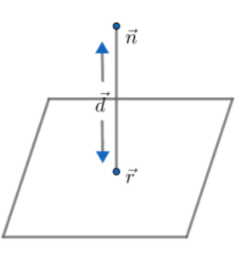Question
Question: Write the vector equation of the plane passing through the point (a, b, c) and parallel to the plane...
Write the vector equation of the plane passing through the point (a, b, c) and parallel to the plane r⋅(i^+j^+k^)=2
Solution
To solve this question, we will use general equation of a plane where normal vector is n and distance d the general equation of a plane with normal vector n and distance d from point of a position vector r is given by: r⋅n=d
We will compare this to r⋅(i^+j^+k^)=2 and try to get the value of 2 in term of a, b and c. In between while calculation, we will use dot product of two vector.
Complete step-by-step solution:
Dot product of two vector p and q where p=xi^+yj^+zk^ and q=x′i^+y′j^+z′k^ given by
p⋅q=xx′+yy′+zz !!′!!
The general equation of a plane with normal vector n and distance d from point of a position vector r is given by:
r⋅n=d

Comparison our given equation from given equation r⋅(i^+j^+k^)=2 we get that the normal vector n=i^+j^+k^ and distance d.
So, we have r⋅(i^+j^+k^)=d . . . . . . . . . . . . (i)
Where i^+j^+k^ is the normal vector.
We are given that, the point is (a, b, c) then, writing this (a,b,c)=ai^+bj^+ck^ is the position vector of the point (a, b, c).
Position vector of a point (p, q, r) is given as pi^+qj^+rk^ because r=ai^+bj^+ck^ is the position vector of point (a, b, c).
Substituting this r=ai^+bj^+ck^ in equation (i) we get
⇒(ai^+bj^+ck^)⋅(i^+j^+k^)=d
Dot product of two vector p and q where p=xi^+yj^+zk^ and q=x′i^+y′j^+z′k^ given by
p⋅q=xx′+yy′+zz !!′!!
Using this above to get dot product of above vector, we get:
⇒a+b+c=d
So, we have value of d=a+b+c
Substituting value of d=a+b+c in equation (i) we get
r⋅(i^+j^+k^)=a+b+c . . . . . . . . . . . . (ii)
This is the vector equation of required plane.
Substituting r=xi^+yj^+zk^ in equation (ii) we get:
(xi^+yj^+zk^ )⋅(i^+j^+k^)=a+b+c . . . . . . . . . . . (iii)
Both equation (ii) and equation (iii) are our required vector equation of a plane passing through the point (a, b, c) and parallel to the plane r⋅(i^+j^+k^)=2
Note: We can also use r⋅(i^+j^+k^)=2 as given in the question and substitute d = 2 then, the value of a+b+c=2 then, we can directly substitute a+b+c=2 in equation (ii) that is r⋅(i^+j^+k^)=a+b+c=2⇒r⋅(i^+j^+k^)=2 then, the final answer would be (xi^+yj^+zk^ )⋅(i^+j^+k^)=2 which is required result.
